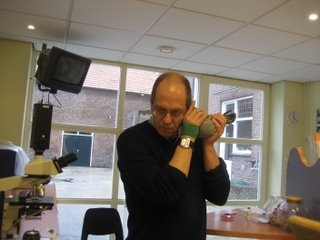In June 2016 - by Dr. Peter Boskamp...
Vaccination, injecting and syringes for the treatment of diseases
Last week I was on the spot of a pigeon Association, to investigate pigeons. A member told me that he his pigeons at a bird veterinarian has examined. This told him that his pigeons by the herpes virus were infected and then would he his pigeons, however, "vaccinated". Now, this doctor is known that herpes at all may play a role in homing pigeons for his dislike. Even bigger surprise with me, not only that this disease was detected but even more. It was decided to vaccinate against this disease. I was encouraged in my knowledge that this colleague does not really believe in vaccination against herpes, because he "had been vaccinated with an antibiotic". How do we get confusion in the pigeon sport? Now in this way. When vets call an antibiotic injection vaccination we carry gutglaübige breeder astray. But not only that the “Vaccination” with antibiotics has little or even no use in viral diseases. The result is that the breeder practically no results of the “Pseudo vaccinations” determine and subsequently see no benefit in real vaccinations.
We all need to leave the people not in the dark. It's hard enough to practice the sport for many people. If then still confusion is promoted is the end in sight.
The vaccination
This term is reserved to prevent diseases of preventive vaccination of healthy animals. For example, the mandatory annual vaccination against Paramyxovirose is a vaccination. There are also other diseases against which we vaccinate. These are among others against smallpox, paratyphoid, adenoviruses, herpes virus, to name a few. When these pathogens weakened in healthy animals are injected is stimulates the immune system of the pigeons. There antibodies against the target diseases are produced, so that, as soon as a contact with the real disease occurs, less or no symptoms are developed. I write here, attenuated pathogens at a vaccination to be injected. This is not always true. There are also vaccines where the attenuated pathogens are freeze-dried. Here you can get the vaccine as some kind of pills in a bottle, which can be solved using the supplied water. These vaccines are stable only a very short time after the dissolution in water. To use these vaccines several days has therefore little or no value. Live vaccines contain weakened versions of the pathogen. The effect of these vaccines must be inspected again constantly, to prevent that the animals of the vaccination will be sick. It is known that smallpox vaccine was on the market, whose vaccine virus was so strong that the animals became ill after the application of the vaccine on smallpox. So, the vaccine itself for the emergence of smallpox was responsible. The opposite was the case. That is, that the vaccine virus was too weak, to develop an adequate immunization of the body of the pigeons. This phenomenon can also occur if you stand too long leaves the reconstituted vaccine at a high temperature. The effectiveness of the vaccine fades quickly with the result that later in the season the vaccinated birds fall ill with smallpox. It is clear now that it is necessary to perform an accurate and proper vaccination to achieve a satisfactory effect.
There are not only live vaccines but also death vaccines. These are often against diseases whose Impfung pose too great a risk. There remains the risk that the live, weakened viruses and bacteria can grow back stronger and lead to problems with vaccines.
In this way, the animals can be still sick. To prevent this, some pathogens are especially preferred in the killed vaccines. This is including the case with vaccines against Paramyxoviruses. Virtually all vaccines for paramyxovirus include death vaccines. In the early years of the eruption of the Paramyxovirose, the Newcastle virus was used a live, attenuated version of chicken. This vaccine has been dripped, sprayed or applied for drinking water. The protection was only for a few months. Practically, this has no sufficient protection because the growers have vaccinated not every three months.
Death vaccines offer today usually provide good protection. There are always exceptions.
Vaccination is not the same vaccine
We should distinguish between a protection achieved by vaccination against a virus disease and an optimum protection can be achieved through an elaborate routine immunization schedule. Most of the marketed vaccines provide protection, so that no symptoms can be observed. However, you do not warrant that no “healthy carrier” can sit among the vaccinated animals. Exactly this phenomenon prompted the authorities in Europe for many diseases to prohibit a vaccination. Cause such diseases are (preventive) killed all the animals. The bird flu virus is one example. The authorities do not want that “healthy carriers” (IE. those who are infected with this flu virus) sit in a group of vaccinated animals. One of the reasons is that these viruses could be dangerous for people. This minimizes the risk.
If an animal at the time of the Inpfung is not healthy, then the immune system is not sufficiently respond to the vaccination. This can make not enough antibodies to neutralize them during an attack by real pathogens. For example, it can happen a real can keep pathogen without actually sick. One can however imagine that in the time of Wettflüge the pigeon not in the position will be to reach top form.
A Paramixo quick test shows me that (older) vaccinated birds, the virus itself bear. The vaccine manufacturers recommend therefore to vaccinate the pigeons, to achieve the highest possible level of antibodies and reduzeiren the probability of the emergence of carriers for the first year at least twice. The practice with the combination vaccine Paramixo/herpes virus has taught us that a single vaccination is not effective against this virus. It should be repeated that's why a vaccination against the virus weeks after 3-5. Because this is a combination vaccine with paramyxovirus is also automatically vaccinated twice against this virus. The practice shows that the problems of the young pigeons on the respiratory problems are reduced. This second Paramixo vaccination is responsible in part for this. After all, we see this often in years be vaccinated against Paramyxoviruses. Try with double vaccination against the paramyxovirus could possibly be responsible that fewer years lost.
As long as there are lovers but who regard all these vaccinations as nonsense and just do it to get the vaccination certificates, the problems with the Pparamyxovirus remain.
Anyway, my opinion is to vaccinate, thus the risk of suboptimal or poor form during the season to meet the best against all diseases.
A very different phenomenon occurs on the side of fans who believe in the benefits of vaccination. We are seeing a trend a few weeks before the season to give an additional vaccination the pigeons, for example with paratyphoid vaccine, to give a kick in the ass to the immune system of the pigeons. Here, one dispute however about the effectiveness of. A scientific basis for this action is not there yet. (In) efficiency is therefore still not scientifically proven.
Finally, I want to return still on it such as by some vets the injections against Ornithosis and herpes than vaccinations “sold” be.
Let not be fooled. Ask your veterinarian for the name of the “Vaccine”. If this name is not called you can be sure that only an antibiotic was injected. The effectiveness of a single injection of antibiotics against infections such as Ornithosis or herpes is very questionable. To be effective requires more than a single injection. This injection as a vaccine for sale is more than misleading.
The book ' Duiven gezond houden' gives more information about vaccinations and viral infections.

Good luck
Peter Boskamp
Here it goes directly to the  webshop... (click)
webshop... (click)
Pigeon vet Center
Julianalaan 7a, 6191 AL BEEK (Limburg) NL
E-mail: Info@pigeonvetcenter.com
Phone: 0031 46 4371885
Fax: 0031 46 4360346
 en. The application of alternative veterinary equipment (such as herbs) occupies a high priority medicines regulator in addition to the application. We strive in practice through regular preventive health checks to forestall excessive use of drugs. The application of immune strengthening herbs is used with the same goal. Above methods are combined with preventive vaccinations, sure that the pigeons with increased defense can start in the season. In this way can be scooped during the season also unnecessary treatments, so that time and space to improve the shape of animals and thus to higher performance occur.
en. The application of alternative veterinary equipment (such as herbs) occupies a high priority medicines regulator in addition to the application. We strive in practice through regular preventive health checks to forestall excessive use of drugs. The application of immune strengthening herbs is used with the same goal. Above methods are combined with preventive vaccinations, sure that the pigeons with increased defense can start in the season. In this way can be scooped during the season also unnecessary treatments, so that time and space to improve the shape of animals and thus to higher performance occur. Several times per year we send information for pigeon lovers, as well as an overview of drugs frequently used in Pigeon racing to all pigeon fanciers, registered with us. On request, we will send information about new developments, new products and other information relevant to the pigeon sport also regularly by E-Mail.
Several times per year we send information for pigeon lovers, as well as an overview of drugs frequently used in Pigeon racing to all pigeon fanciers, registered with us. On request, we will send information about new developments, new products and other information relevant to the pigeon sport also regularly by E-Mail.Office hours:
We have three daily office hours from Monday to Friday:
09:00 09:30
13:00 13:30
18:00 19:00
On Saturdays we have consultation by:
11:00 12:00 uh
Office hours vet P. Boskamp:
Monday: 09.00 - 09.30 and 18.00 - 19.00
Tuesday: 13.00 - 13.30
Thursday: 09.00 - 09.30 and * 18:00 - 19: 00 * (* not on the 1st Thursday of the month.)
Outside these hours, you can visit us always by appointment.
From March 1 to September 1 we have an additional office hours for vaccinations from 11.30 to 12.00 uh







